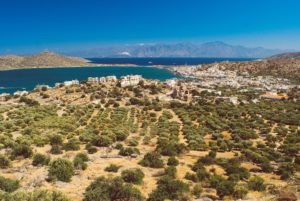Written by Vicky Ethymiadou
Someone interested in visiting Delos can easily find daily cruises from the island of Tinos and Mykonos. You might see boats and tourist centres offering these trips and think to yourself whether the island of Delos is worth visiting.
Delos is well worth visiting and is sure to be one of the most memorable experiences of your trip to Greece. The island of Delos is the conceivable center point of the Cyclades (cyclos meaning circle in Greek). Nowadays it is exclusively an archeological site yet for centuries (BC and AD) it was a mythological, religious, historical, cultural and strategic focal point.
How to visit Delos
My kind of plan includes a day visit to Delos as soon as the archeological site is open until its closing time and the last boat sails back.
Be prepared for a drenching sunbathe (or serious sunburns) as the island is one of the sunniest places in Greece. The marbles of the archeological site reflect the sunrays. Locals, tour guides and archeologists stand out because they are fully clothed with long sleeved breathable shirts, long trousers, wide brimmed hats, sunglasses and training/hiking shoes.
As long as you remember a hat and suncream, then Delos is well worth visiting. Even though the virgin crystal emerald waters surrounding the island are most inviting, swimming is not allowed because they are considered part of the archeological site.
Why visit Delos
One of the highlights of your cruise to Delos is the dolphins that follow the boat playing along with the foamy waves generated by the vessel. It’s worth hiring a tour guide so as not to wonder without knowing where you stand and listen to interesting stories from the ancient times to the 1960’s (when celebrities ran around naked).
Now a UNESCO world heritage site, Delos is steeped in mythology and history and well worth visiting.
The mythological story of Delos
Mostly known as the island where Titaness Leto gave birth to the twin deities Apollon and Artemis. The myth is as follows: Leto in labor is persecuted by Hera because she had sexual intercourse with Zeus and carries his offsprings. No place provides shelter for fear of the wrath of Hera. In the end, only the rocky, arid and barren Delos accepts to host Leto, after her vows and assurances that the god who will be born will become the protector of the island.
Eíleithýia, the midwife of the gods, rushes to Delos under the orders of Zeus. Leto delivers Apollo (& Artemis) under a palm tree. The verses of the Homeric hymn of Apollo (not sure composed by Homer but it’s attributed to him due to its form) describe the birth of the god:
The homeric hymn to Apollo
115. Soon as had set foot there on Delos the goddess of childbirth
Eíleithýia, the pangs seized Leto, who yearned to deliver.
Throwing her arms then around a date-palm, she fell to her knees right
there on the soft meadowland, and the earth began smiling beneath her;
he leapt forth to the light; all the goddesses cried out rejoicing.
Thereupon, glorious Phoibos, the goddesses purely and cleanly
bathed you in beautiful water and swathed you in whitest apparel,
delicate, recently woven, and fastened about you a gold band.
Nor was Apollo the god of the gold sword nursed by his mother;
rather, of nectar and lovely ambrosia Themis provided
him a due share with her deathless hands; then Leto was gladdened,
seeing that she had brought forth so mighty a son and an archer.
But then, Phoibos, as soon as you ate the ambrosial victuals,
then no longer the gold cords held you, panting and struggling,
nor did the bonds restrain you, but all their knots were unloosened.
Then to the deathless goddesses spoke forth Phoibos Apollo:
“Ever belovèd to me may the kithara be, and the curved bow;
I will declare to mankind great Zeus’s infallible purpose.”
So having spoken began to go forth on the earth of the wide ways
Phoibos of hair unshorn who shoots from afar; and at him then
marveled the goddesses all; and with gold all Delos was heavy
laden as she caught sight of the offspring of Zeus and of Leto,
gladdened because it was she that the god had chosen as dwelling,
over the islands and mainland—she loved him the more in her spirit,
blooming, as when with its woodland flowers a mountain-top blossoms.
Translated by Rodney Merrill, Center for Hellenic Studies, Harvard University
Strategically chosen by the ancient Greeks, Delos position allows to sail from the mainland (Athens) to Delos in daylight and from Delos to the east shores of the Aegean Sea in daylight as well. From the hilltops of Delos one can see almost the rest of the Cycladic islands (Naxos, Paros, Sifnos, Serifos, Tinos, Mykonos), the visibility is excellent due to the sunshine and the strong blowing winds.
Therefore, any approaching friendly or enemy ship is visible from afar, in combination with the many bays that are used as safe ports for their ships, the ancient Greeks had found the ideal natural naval and commercial base of its time. To mark the significance of Delos, ancient Greeks created the myth of Apollo’s birthplace and declared it sanctuary!
The history of Delos
After the Greeks had defeated the Persians (the Battle of Plataea), they founded the “Delian League” (I like to think of it as the NATO of the ancient times) whose purpose was to protect all Greek cities-members in case of invasion by the enemies (Persians or non-league members). Delos was the official meeting place and where the league treasury stood until Pericles moved the treasury to Athens and began using the League’s funds for its own purposes (in case you were wondering how Parthenon was financed).
Athenians decided the “cleansing” of Delos, ostensibly for reasons of piety. They opened all the tombs that existed on the island and transported the bones and the offerings to Rhenia (an island next to Delos), where they buried them in a common pit after having removed all the bounties (dead people used to be buried with their precious and beloved items such as jewellery, armature etc.).
At the same time, they decided that no one should be born and die in Delos. But that the women in labor and the seriously ill be transferred to Rhenia. Since then no one was born, no one died and no one was buried on the Holy Island. The Delians, as the Athenians sought, became stateless. This led to a conflict between Athens and the less powerful members of the League and prompted the outbreak of the Peloponnesian War. The League was dissolved upon the war’s conclusion.
Not to be missed when visiting Delos
If you do decide to visit Delos, some highlights you should be sure to see include:
- The Sacred Way
- The Terrace of the Lions (some missing lions or heads of them can be found in Venice, Italy)
- The house of Cleopatra
- The house of Dionysus (for the floor mosaics)
- Heraion (Temple of Hera)
If you are extremely lucky or as passionate as I am, you should know that in Greece during summer fullmoon nights archeological sites stay open and usually host a concert or some cultural event. Call me romantic but I would like to spend a night under the moonlight on Delos island listening to the music of my favourite composer, Manos Hadjidakis.




